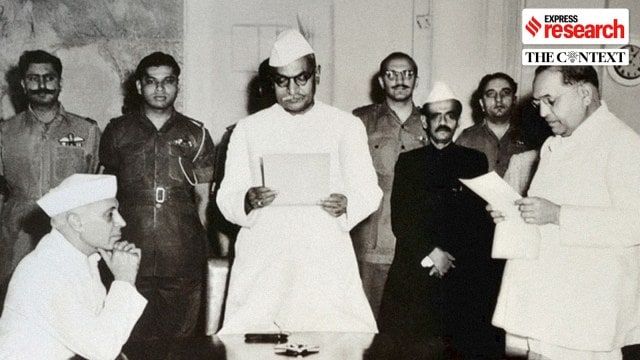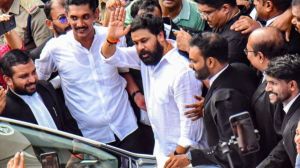At a recent event in Kanyakumari, Tamil Nadu Governor R N Ravi sparked a heated discussion on secularism, asserting that it was “a European concept…not a Bharatiya concept”. Ravi said secularism came into being to end conflicts between the Church and the king in Europe. Secularism was unnecessary in India, he added, pointing out how the original framers of the Constitution too had not included it in the document.
Influenced by European thought, the founding fathers of the Indian Republic were strong proponents of secularism. Yet both Jawaharlal Nehru, the first Prime Minister of India, and B R Ambedkar, chairman of the drafting committee of the Constitution, opposed including the term ‘secular’ in the Preamble.

It was not until The Constitution (42nd Amendment) Act, 1976, during the Emergency imposed by then Prime Minister Indira Gandhi that the words ‘socialist,’ ‘secular,’ and ‘integrity’ were officially added to the Preamble.
Ravi’s recent remarks have reignited a discussion about the relevance of secularism in the Indian context.
Nehru’s idea of secularism
Nehru and Ambedkar were strong advocates of secularism, recognising its essential role in uniting India’s diverse society. However, they hesitated to include the term ‘secular’ in the Constitution, aware that the Western model of separating religion from the state did not fit India’s interconnected religious and political landscape.
In his article Nehru and Secularism (1978), Mohammad Ghouse argues that Nehru viewed secularism as a functional concept rather than a rigid institutional one, which is why he chose not to define it explicitly in the Constitution. Instead, he established a flexible framework that upholds essential principles: the Constitution establishes no state religion, extends citizenship to all, guarantees equality of status and opportunity, and affirms the dignity of every individual, Ghouse said. The Preamble commits to securing social justice for all and prohibits discrimination based on caste or creed, all while striving to free politics from religious influence, he added.
During the Constituent Assembly debates, Nehru emphasised the perils of intertwining religion and politics, stating, “In any event, now there is no alternative; and we must have it clearly in our minds and in the minds of the country that the alliances of religion and politics in the shape of communalism are a most dangerous alliance, and they yield the most abnormal kind of illegitimate brood…the combination of politics and of religion is a most dangerous combination…it is harmful to the majority… it is most harmful to any minority that seeks to have some advantage from it.”
Story continues below this ad
He agreed with Ambedkar, who argued that democracy would be hollow in the face of rampant communalism. In Nehru’s worldview, communalism and majoritarianism had no place.
Scholar Krishna Roy, in the article Indian Secularism – Distinctive Ideas of Jawaharlal Nehru (2015), highlights three key features of Nehru’s concept of secularism.
Firstly, he says, Nehru supported fighting communalism through social welfare and political engagement, while respecting religion. The Indian Constitution guarantees religious freedom for all citizens.
Secondly, he viewed Indian secularism as qualified not absolute; religious freedom is subject to public order, morality, and the welfare of citizens. This means that the free exercise of religion must align with norms that prevent the establishment of religion by the state, as detailed in Articles 27 and 28.
Story continues below this ad
Finally, Roy emphasises that Nehru’s vision of secularism was both dynamic and enlightened, allowing for religion to play a role in social welfare. Nonetheless, the government retains the authority to amend or redefine the personal laws of any community as deemed necessary.
Ambedkar’s stance: ‘Must be decided by people themselves….’
Ambedkar shared Nehru’s perspective on the separation of religion and politics.
When the Constituent Assembly discussed the inclusion of the words ‘secular’ and ‘socialist’ in the Preamble, Ambedkar put forward the following argument: “What should be the policy of the State, how the Society should be organised in its social and economic side are matters which must be decided by the people themselves according to time and circumstances. It cannot be laid down in the Constitution itself because that is destroying democracy altogether.” The Constituent Assembly subsequently decided not to include the words.
In her article, Secularism in the Constituent Assembly Debates, 1946-1950, academic Shefali Jha references a debate from the Constituent Assembly in April 1947, noting that “Ambedkar’s suggestions were incorporated in another explanation to Article 16, stating that ‘No person shall refuse the performance of civil obligations or duties on the grounds that his religion so requires’ as well as in Article 19, which declares that ‘The state shall not recognize any religion as the state religion’.”
Story continues below this ad
‘An insecure PM’
The Constitution (42nd Amendment) Act, enacted during the Emergency period in 1976, added the word ‘secular’ to the Constitution. However, Indira Gandhi’s approach to secularism sharply contrasted with that of Nehru.
Eminent lawyer A G Noorani, in his article Indira Gandhi and Indian Muslims (1990), pointed out that Gandhi’s image as the ‘protector’ of Muslim interests persisted even as the community became more of a vote bank. Despite leveraging their support, she resented their rights as independent of her or her party, he said.
In his speech, Ravi made a pointed reference to Indira Gandhi, saying it was “one insecure prime minister” who got the word ‘secular’ added to the Constitution.
As the relevance of secularism in the Indian context continues to be debated in public discourse, political parties continue to reinterpret the term for their agendas, undermining what Nehru once sought to enshrine in the Constitution.

































